The Dell XPS 13 (9300) Review: Return of the King
by Brett Howse on July 16, 2020 10:00 AM ESTBattery Life
One area that the XPS line has historically done very well was in battery life. This has been a combination of Dell building very efficient devices, as well as providing above-average battery capacities. For the 2020 XPS 13, Dell is offering a 52 Wh battery, which is somewhat smaller than they have in previous models. We shall see what kind of an impact that has on the overall runtime of this notebook. To fairly compare models, all devices are tested with the display brightness set to 200 nits.
Web Battery Life
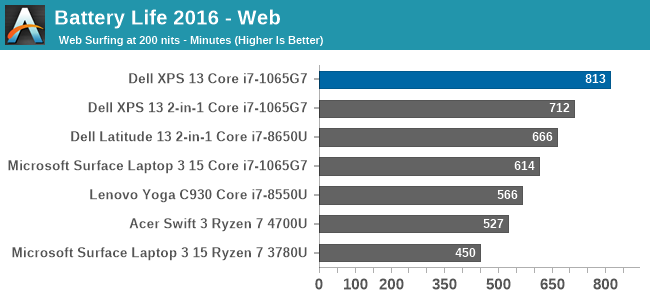
Dell starts out strong with an excellent result on our web battery life test. It managed to achieve over 13.5 hours of runtime on this fairly demanding web workload.
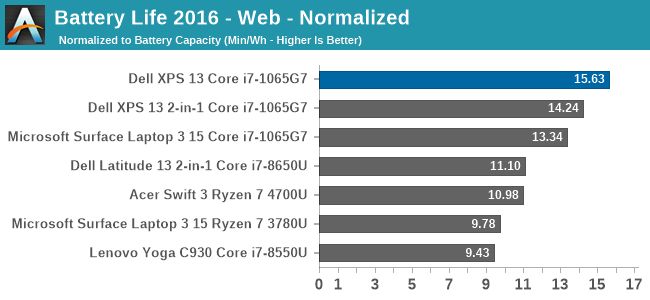
The normalized result removes the battery size from the equation so we can get a clearer picture on overall device efficiency, and we can see why the XPS 13 has lost none of its amazing battery life despite Dell shrinking the battery capacity. Dell continues to lead the field here, at least with the 1920x1200 display that we reviewed. Certainly the higher-resolution, wide-gamut 3840x2400 panel would impact this result significantly.
PCMark 10 Modern Office Battery
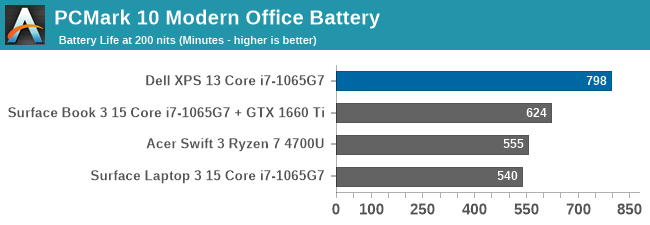
A new benchmark added to the stable is the PCMark 10 Modern Office Battery test, which runs through several common office scenarios on a ten-minute loop. If a device is able to finish the tasks quicker, it gets to idle for a higher percentage of the ten-minute test loop, so efficiency is important, but performance also plays a factor. The XPS 13 once again achieved a very strong result, almost matching the web runtime.
Movie Playback
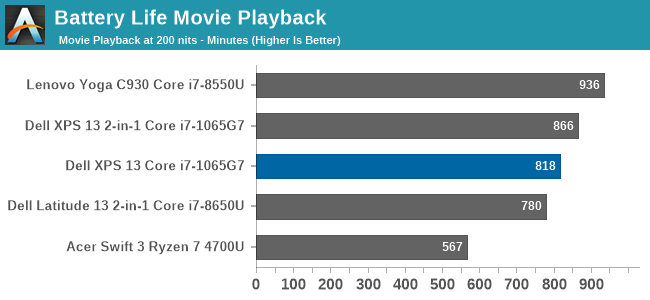
On the movie playback we generally see devices offer even more battery life than the other tests, but the XPS 13 showed such platform efficiency in the previous results that it was not able to extend that much here, but it is still a very strong result.
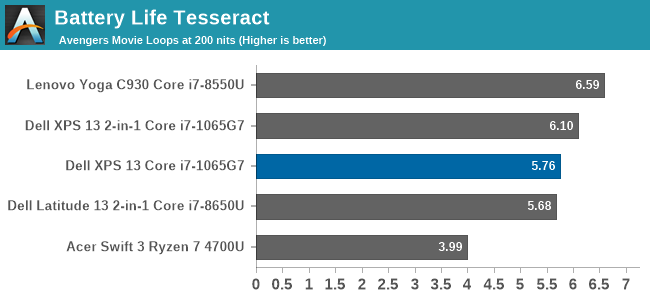
Breaking the movie playback into number of times you can play a very long movie, the XPS 13 almost achieves six complete playbacks of The Avengers before shutting down.
Charge Time
Dell ships a 45-Watt AC adapter with the XPS 13, which charges over a USB-C connector. Since there are Thunderbolt 3 ports on both sides of the notebook, it allows you to charge from whatever side is most convenient, which can help with cable management and is always a nice bonus.
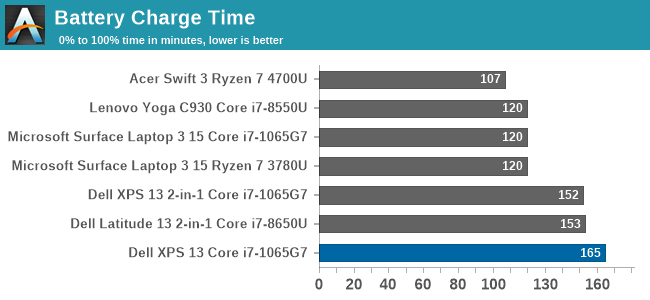
The small charger is plenty to run the notebook, but the charge rate is not spectacular. Luckily, the excellent battery life does mitigate this. Dell does offer an ExpressCharge option which will charge the battery to 80% in one hour and fully charge in two hours, however the user has to specifically choose this if they desire it using the Dell Power Manager software.










224 Comments
View All Comments
Korguz - Friday, July 17, 2020 - link
Santoval, look who made the comment, there is no need to say anything else. its self explainitory.Santoval - Friday, July 17, 2020 - link
Is it? I have no idea who "Deicidium" is, sorry..Korguz - Friday, July 17, 2020 - link
then you haven't been reading here that much. he will bash and any chance he can, while praising his gods intel and nvidia, with no proof at all of his claims.Korguz - Friday, July 17, 2020 - link
bash amd any chance he canDeicidium369 - Friday, July 17, 2020 - link
I got you mixed up with Spungy, have no clue who you are either.Deicidium369 - Friday, July 17, 2020 - link
Run along little boy.Deicidium369 - Friday, July 17, 2020 - link
Zen 1 vs Zen 3 are minor architectural tweaks and improved manufacturing and packaging ("chiplets" and IO die) - per core performance has not increased any more than Skylake to to Coffee Lake to Comet Lake. Minor tweaks. So still competing at Skylake level perormance.Well moved on - Last 14nm server CPU has shipped - last 14nm desktop CPU is shipping later this year. Ice Lake is widespread enough to count - in way more designs than AMD.
Leaks show that 8C monstrosity to be 17% better perf than 4 cores on Tiger Lake.
Rocket Lake is basically backported Ice Lake/Tiger Lake to 14nm - so no Skylake there. Sunny Cove/Willow Cove/Golden Cove ARE NOT SKYLAKE. New arch. I know you know this.
Korguz - Friday, July 17, 2020 - link
going by that same logic, all intel cpu's since skylake are also minor architectural tweaks and improved manufacturing as well, whats your point ?" Last 14nm server CPU has shipped - last 14nm desktop CPU is shipping later this year" oh ? lets see you post proof of this. oh wait, you cant, cause there isnt any proof.
" Leaks show that 8C monstrosity to be 17% better perf than 4 cores on Tiger Lake. " like another mentioned, still cherry picking are you ?
IF it was a new architecture, intel them selves would of called it gen 1, not gen 10/11/12/etc.
schujj07 - Saturday, July 18, 2020 - link
Per core performance hasn't increased from Zen 1 to Zen+, to Zen 2??? Whatever you are smoking I hope you share. Clock for clock Zen 2 is about 18% faster than Zen 1, that means per core performance is higher. Whereas Intel hasn't increased per core performance since 2015. Before that Intel hadn't had more than minor changes since the change from Nehlema to Sandy Bridge. After that they had nothing more that 5% IPC improvements, all other performance increase was sheer clock speed.Odds are that Rocket Lake will not clock as high as Skylake derivatives. It will need to have a massively higher IPC to counteract the loss of clock compared to Comet Lake. On top of that it will probably be very power hungry due to the bigger chip and added complexity.
gescom - Friday, July 17, 2020 - link
Similar single performance at much lower power consumption.https://www.notebookcheck.net/Lenovo-ThinkPad-T14s...